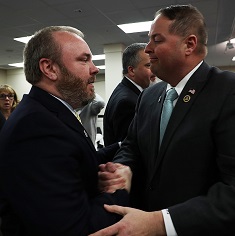FRANKFORT, KY (March 7, 2019)—A bill that would legalize medical marijuana under Kentucky law is on its way to the full House for a vote after clearing the House Judiciary Committee last night.


House Bill 136, sponsored by Rep. Diane St. Onge, R-Fort Wright and Rep. Jason Nemes, R-Louisville, would allow Kentuckians to be prescribed medical, or medicinal, marijuana that is licensed to be grown, processed and dispensed in the state. Only patients with specific conditions outlined in the bill could be prescribed medical marijuana, and then only by their regular physician.
Conditions that could be treated by medical marijuana under HB 136 include epilepsy, multiple sclerosis and Crohn’s disease, to name a few.
Thirty three other states including Ohio have already legalized medical marijuana, said St. Onge. She called HB 136 the “tightest” medical marijuana legislation in the country.
The bill would not allow medical marijuana to be smoked, would not allow marijuana plants to be grown in patients’ homes, and would limit the THC (the main hallucinogenic compound in marijuana) content of processed medical marijuana to 70 percent. Excise tax revenue generated by the bill would be put in a trust fund to help cover medical marijuana prescription costs for indigent Kentuckians.
St. Onge said HB 136 isn’t about revenue--it is about compassion for nearly 60,000 Kentuckians living with chronic pain and other health issues.
“We feel that we are not serving the Commonwealth and her citizens well by ignoring this large population of people who cannot find any comfort,” said St. Onge.
Nemes pointed out safety provisions in the bill designed to protect patients who could be prescribed medical marijuana should the bill become law.
PHOTO: Rep. Jason Nemes, R-Louisville, (at left) and Rep. John Sims Jr., D-Flemingsburg, stopping to talk after testifying on House Bill 136, a bill that would legalize medical marijuana in Kentucky.
“We hear a lot today about how marijuana is so much more potent than it used to be, and that’s true,” said Nemes. “Well, the good thing about this bill is, the people who need marijuana to help themselves, that product they’ll be buying at the dispensary will have been tested to make sure that it’s safe.”
Questions about how an employer could respond to an employee’s medical marijuana use should HB 136 become law were answered by St. Onge, who said employers would not be precluded from having a zero-tolerance drug policy in their workplace.
“The company can say we have a zero-tolerance program in effect, and you are put on notice of that,” she told the committee, adding that the bill is strictly for medical marijuana and not recreational marijuana.
Speaking against the bill was Louisville-area pain specialist Dr. James Patrick Murphy, MD. He said more study is needed on medical marijuana before it is prescribed to patients.
“We’re just not ready yet for it to be a medicine to be prescribed. It’s simply not a medicine to prescribe,” he told the committee. St. Onge disagreed.
“There are mistakes that are made with the FDA. They are not God, they are not foolproof,” she said. “They are important, we want them to study but in the meantime these … people who are using (medical marijuana) and garnering some measure of their life back, some amount of relief, these people need to be listened to also.”
Rep. Angie Hatton, D-Whitesburg, said she supports the legislation. Hatton said opioid deaths have decreased by as much as 25 percent in state that have legalized medical marijuana.
“It could be such an important tool to help those who are suffering,” said Hatton. “It’s not physically addictive, it’s been around for 5000 years, it’s legal in 33 states, still I’m aware of no deaths that have been reported. In Kentucky, we have four deaths per day from opioid overdose.”
The bill ultimately passed the committee with overwhelming support. Sixteen committee members voted in favor of passing the bill out of committee. Only one member opposed the bill, and one member --House Judiciary Committee Chair Rep. Jason Petrie, R-Elkton -- passed on the vote.
Petrie said he has “lingering questions” about how the legislation would be impacted by federal and financial rules. But, Petrie said, he appreciates the work that the sponsors have done on the bill.
“I still have concerns and I think those concerns need to be addressed. But I’m not moving the target on you,” he said. “I think the bill is much better.”









